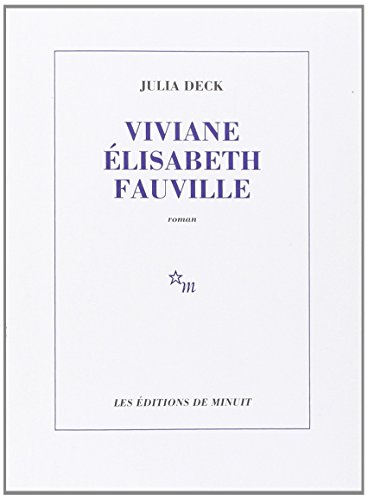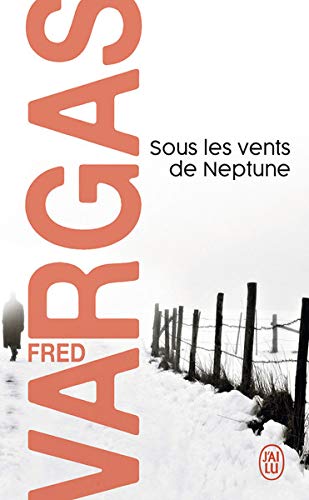
8 French Books for Intermediate Learners
Ready to move past “Le Petit Prince,” but not ready for “Les Misérables“?
Picking the right French language book can be a bit of a challenge, especially for intermediate French learners.
But once you’ve moved past the beginner level, learned a hefty amount of vocabulary and feel comfortable with French grammar, you’ll be able to pick up intermediate-level books that not only improve your French but also provide insights into French culture.
There are so many fun, interesting French novels that are written for the general public and appeal to French readers of all levels—particularly for intermediate learners. Read this post for eight of the best French books for intermediate learners.
Contents
- 1. “La Trilogie des fourmis“ (The Ant Trilogy)
- 2. “L’Élégance du hérisson” (The Elegance of the Hedgehog)
- 3. “Viviane Elisabeth Fauville” (Viviane: a Novel)
- 4. “Sous les Vents de Neptune” (Wash This Blood Clean from My Hand)
- 5. “L’apocalypse est pour demain” (The Apocalypse Starts Today)
- 6. “L’étranger” (The Stranger)
- 7. Short Stories in French: New Penguin Parallel Text
- 8. L’Anglais (The English)
- How to Approach French Novels as an Intermediate Learner
- And one more thing...
Download: This blog post is available as a convenient and portable PDF that you can take anywhere. Click here to get a copy. (Download)
1. “La Trilogie des fourmis“ (The Ant Trilogy)
Author: Bernard Werber
“L’Élégance du hérisson”
I know what you’re thinking—why would I want to read a book about ants? Let me reassure you: the author, Bernard Werber, is an expert at weaving a fascinating story together so that it’s easily understandable. Before you know it, all you’ll be thinking about is this empire of ants.
There are three books in this series: “Les Fourmis” (“Empire of the Ants” in English), “Le Jour des fourmis” (“The Day of the Ants”) and “La Révolution des fourmis” (“The Revolution of the Ants”).
Since the first book’s release in 1991, it has sold more than two million copies and has been translated into over 30 languages.
Werber uses a lot of dialogue, which is great practice for following French conversation, the storyline is engaging and the language and vocabulary is easy to understand, even for low-level intermediate speakers. The story is set in the present time and shows two different worlds: one of the humans and one of the ants.
There are two main characters: a male human and a female ant. When the human inherits a house and a strange message from his uncle, he goes into the cellar to try and solve the mystery—but never returns. When others follow him, they disappear as well. At the same time, the ant is on a foraging expedition that gets destroyed from an unknown source and she assumes another ant colony is trying to destroy them.
These two worlds eventually collide—but you’ll have to read the series to find out how.
2. “L’Élégance du hérisson” (The Elegance of the Hedgehog)
Author: Muriel Barbery
Find it on Amazon
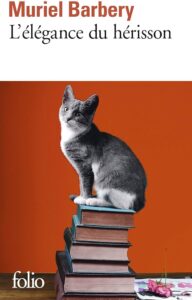
I’m sensing a theme…an animal theme!
This time, the main characters are only humans. The book, written by philosopher Muriel Barbery, includes two narrators: Renee, a middle-aged concierge in a Parisian building, and Paloma, a young girl who lives in one of the apartments in the building. These two starkly different people actually share a similar problem—they’re both highly intelligent people who hide their gifts and passions in order to be accepted.
The story is told from both narrators’ perspectives, who, strangely enough, don’t meet until an unexpected event brings them together.
The book was extremely well received after its publication in 2006, and it’s still known today as one of the most prized French novels. This novel is for philosophy and art lovers who enjoy books with character-driven stories.
3. “Viviane Elisabeth Fauville” (Viviane: a Novel)
Author: Julia Deck
Find on Amazon
This short but riveting psychological thriller by Julia Deck stars a recently divorced young mother and her struggle to start a new life.
She’s recently moved out of the apartment she shared with her husband and into her own apartment in Paris with her newborn daughter. What starts out as a basic first-person narrative turns into a strange mystery as Viviane stabs her psychiatrist with a knife she received as a wedding present. Soon thereafter, the police begin investigating.
Though told entirely from Viviane’s perspective, the novel switches pronouns—from je (I) to tu (informal “you”) to vous (formal “you”) to on (we).
This novel is great for practicing recognition and comprehension of subject-verb agreement, especially since the narrator switches pronouns so often. Ms. Deck uses common language, so it’s not at all a difficult read, but you have to pay close attention due to the pronoun shifts. However, the story is certainly addicting and Viviane’s personality sucks the reader into her impulsive murder and its consequences.
4. “Sous les Vents de Neptune” (Wash This Blood Clean from My Hand)
Author: Fred Vargas
Find it on Amazon
“Wash This Blood Clean from My Hand” is part of author Fred Vargas’ Commissaire Adamsberg series. It features commissaire Jean-Baptiste Adamsberg as the main character.
This story features one strange weapon—a trident—and a slew of killers who can’t recall their actions after losing consciousness the night of each crime. Commissaire Adamsberg believes all these murders lead back to one person, who may have also been responsible for an accusation which was made years earlier regarding Adamsberg’s own brother. When history repeats itself and his brother is accused yet again of another murder, Adamsberg goes on the hunt for the man responsible to reconcile the problem once and for all.
Crime novelist Fred Vargas won the Crime Writers’ Association Duncan Lawrie International Dagger for this haunting story. She has won the award for two other novels as well, and her beautiful prose and expert storytelling is a treasure for anyone who loves a good mystery and excellent writing.
5. “L’apocalypse est pour demain” (The Apocalypse Starts Today)
Author: Jean Yanne
Find it on Amazon
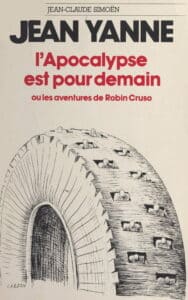
This one’s more of a classic, and it’s an adventure like no other.
It was written in 1977 by Jean Yanne, and it features a man named Robin Cruso who has found himself in a world where cars have replaced any other form of transportation—including walking—and pedestrians only exist underground.
The world is essentially a giant traffic jam as more and more cars enter the Earth, and Robin is tired of living like this. He leaves his car to try and stop the Grand Cerveau (The Supreme Mind) who controls the society and to stop his Grand Dessein (Ultimate Plan).
Yanne’s writing is easy to follow and extremely engaging. Robin is a loveable character who’s trying to turn his crazy, out-of-control society back to normal, and it’s impossible not to want to figure out how the story ends.
6. “L’étranger” (The Stranger)
Author: Albert Camus
Find it on Amazon
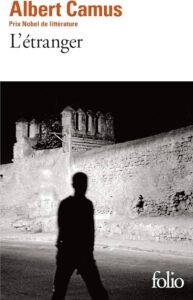
One of my absolute favorite French novels at any level, “The Stranger” by French philosopher and writer Albert Camus was published in 1942, but it feels like it could have been written today. It tells the story of Meursault, a detached and apathetic Algerian Frenchman, who becomes embroiled in a senseless murder on a beach. Meursault’s emotional detachment and indifference to societal norms make him an outsider, and his trial becomes a commentary on the absurdity of human existence and the arbitrary nature of justice.
Camus’ writing style is characterized by its concise and straightforward prose, reflecting Meursault’s own blunt and matter-of-fact perspective. The novel delves into the philosophical concept of the absurd, suggesting that life lacks inherent meaning and purpose. Meursault’s eventual acceptance of the absurdity of life is a central theme, culminating in his famous declaration of defiance in the face of death.
“The Stranger” remains a seminal work in existential literature, provoking deep reflections on the human condition and the nature of existence. It’s also quite an easy read, believe it or not.
7. Short Stories in French: New Penguin Parallel Text
Authors: Marcel Aymé, Honoré de Balzac, Guy de Maupassant, Irène Némirovsky, Colette, Marguerite Duras, Raymond Queneau, Emmanuel Carrère, Daniel Boulanger, Maupassant, Eugène Ionesco and Marie-Anne Le Pezennec
Find it on Amazon
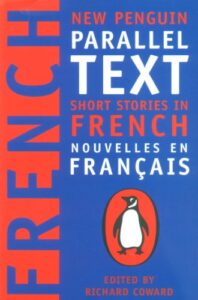
“Short Stories in French: New Penguin Parallel Text” is a collection of contemporary French short stories edited by Richard Coward. It offers a unique language learning experience by presenting each story in both French and English, allowing readers to compare and contrast the two languages. It includes many of my favorite French short stories all in one book, so it’s a no-brainer for intermediate learners.
The stories cover a range of themes and styles, providing readers with a diverse linguistic and cultural experience. It’s also a useful tool for those looking to enhance their language skills in an immersive and enjoyable way.
8. L’Anglais (The English)
Author: Denise Bombardier
Find it on Amazon
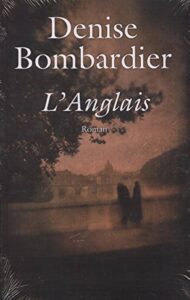
“L’Anglais” is a fantastic novel by Canadian author Denise Bombardier. Published in 1985, it tells the story of Catherine, a French-Canadian woman who falls in love with an Englishman named William during the turbulent times of the October Crisis in Quebec.
The novel explores themes of language, identity and the cultural divide between English-speaking and French-speaking Canadians in Montreal.
Denise Bombardier, known for her insightful social commentary, uses this novel to delve into the complexities of relationships and the impact of historical events on personal lives. “L’Anglais” remains a notable work in Canadian literature, offering a poignant portrayal of love amidst sociopolitical upheaval.
FluentU takes authentic videos—like music videos, movie trailers, news and inspiring talks—and turns them into personalized language learning lessons.
You can try FluentU for free for 2 weeks. Check out the website or download the iOS app or Android app.
P.S. Click here to take advantage of our current sale! (Expires at the end of this month.)
How to Approach French Novels as an Intermediate Learner
It’s always exciting to pick up a book and be able to read for a while without pulling out the dictionary.
But even if you’ve reached a level where reading a novel is no longer difficult, it’s important to remember that you’ll never stop learning. This means that you should have a pen or pencil handy to mark words and phrases that are unfamiliar. You should also keep a dictionary on hand for when you want to look up the words.
If you’re engrossed in a story, it may seem like a pain to look up a word—especially if you’re excited to keep moving.
Make sure you always mark it, though, and come back to it later. The word could prove useful later in the book (authors often use words they like more than once and, if you aren’t familiar enough with it, it could inhibit your reading). It could even be a key word that’ll dramatically change the meaning of the passage you’re reading.
While reading, you might also come across a phrase that seems odd or unfamiliar, and this is where WordReference or a French friend will come in handy. WordReference is a dictionary-like website where you can also look up phrases and find the English equivalent. There’s also a forum where both French and English speakers post questions about language and how it translates.
The best resource, of course, is a native speaker.
Consider making a list of words and phrases you’d like explained and bringing them to your language partner—it would make for a fun exchange of learning about one another’s language as you read.
So, what’s the best way to approach French literature?
Enjoy it! There are so many things to learn, but the most wonderful part of reading is connecting with the story and its interesting characters.
Once you’ve tackled these titles, many more exciting French novels are waiting for you. Once you find the author or genre that suits you best, start picking up books, reading great stories and learning new vocabulary.
Enjoy learning French by reading compelling French literature.
Download: This blog post is available as a convenient and portable PDF that you can take anywhere. Click here to get a copy. (Download)
And one more thing...
If you like learning French on your own time and from the comfort of your smart device, then I'd be remiss to not tell you about FluentU.
FluentU has a wide variety of great content, like interviews, documentary excerpts and web series, as you can see here:

FluentU brings native French videos with reach. With interactive captions, you can tap on any word to see an image, definition and useful examples.

For example, if you tap on the word "crois," you'll see this:

Practice and reinforce all the vocabulary you've learned in a given video with learn mode. Swipe left or right to see more examples for the word you’re learning, and play the mini-games found in our dynamic flashcards, like "fill in the blank."

All throughout, FluentU tracks the vocabulary that you’re learning and uses this information to give you a totally personalized experience. It gives you extra practice with difficult words—and reminds you when it’s time to review what you’ve learned.
Start using the FluentU website on your computer or tablet or, better yet, download the FluentU app from the iTunes or Google Play store. Click here to take advantage of our current sale! (Expires at the end of this month.)

